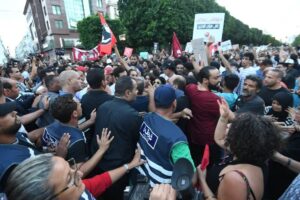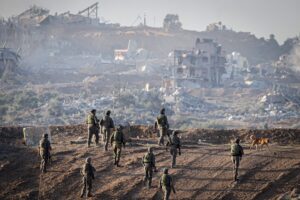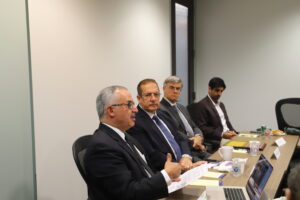
The National Interest Foundation Newsletter
Issue 253, September 20, 2024
Welcome to our NIF Newsletter. In this week’s edition, we provide analysis on the mass rallies taking place in Tunisia ahead of the upcoming October election, look into the Israeli army and its history of committing human rights violations, examine the legal battle in a federal appeals court over a potential U.S. TikTok ban, and also recap our Wednesday panel discussion event regarding the impending election in Tunisia.
Editor: Bassam Tarbush
News Headlines
The Mass Rallies Taking Place in Tunisia Ahead of the Upcoming October Election

Thousands have been rallying in Tunisia against President Saied in the lead-up to the October 6th election. (Photo from AFP)
The Mass Rallies Taking Place in Tunisia Ahead of the Upcoming October Election
By Daniel Imbornoni
Over this past week, thousands of Tunisians have taken to the streets to protest against President Kais Saied as the upcoming October election in the country draws closer. The Saied government itself has engaged in a significant pre-election crackdown, arresting dozens of members of opposition parties and those participating in the rallies, according to human rights monitoring groups such as Amnesty International. Due to Saied’s 2021 coup and efforts to consolidate power since then, many observers have looked towards the election as an important opportunity to push back against the democratic backsliding within the country as a result of Saied’s measures. The arbitrary arrests have come as Tunisians decry the Saied government for its actions, and demand the release of all political prisoners, activists, journalists, and other concerned citizens that have been detained for merely criticizing his autocratic behavior. This has included the use of self-appointed commission members to intimidate candidates and try to suppress opposition in order to manipulate the outcome of the impending election.
Saied was originally elected in the country’s 2019 presidential election, overseen by the country’s Independent High Authority for Elections (ISIE). He had been involved in various social and political youth organizations in the early 2010s, a demographic that he would gain his most support from in the election. Saied ran as an independent outsider, and ironically, advocated for his plans to combat corruption, the institution of recall elections, and a focus on law and order – among other policies. He initially enjoyed support as a popularly-elected candidate, but his government started to face increasing unpopularity during the Covid-19 pandemic. Protests began to break out nationwide when in 2021, the country began to face economic failure and suffered a collapse of its healthcare system. Saied had been in a deadlock with various groups and parties in the country’s parliament, including the Ennahda party, which paralyzed the government amid the crisis and caused the state’s inadequate response. Then, on July 25th of that year, Saied dismissed the Mechichi cabinet, suspended the Assembly of the Representatives of the People, and revoked their immunity; actions that have been widely considered to be a self-coup aimed at consolidating power and dismantling democratic mechanisms in the country. Despite being in violation of Article 30 of the Tunisian Constitution, there was no constitutional court in place at the time to assess the legality of Saied’s actions. Thus, he proceeded to further consolidate power, passing a decree which gave him the authority of appointment over the 7 members and spokesperson of the ISIE and later made his changes official with a low turnout constitutional referendum that was boycotted by much of the country.
The current hopes of pushing back against Saied’s democratic backsliding have been hindered by his ISIE’s detainment and blocking of many top opposition candidates from running, one of which was placed under arrest just two weeks ago. The Tunisian court has ordered the ISIE to reinstate two of the candidates, warning that failure to do so could jeopardize the election. However, the ISIE has not yet done so, which in effect has reduced the power of the judiciary and has served to legitimize concerns of a rigged election. What has also hampered pro-democracy efforts is that the opposition has failed to develop a unified response to the election, that being whether to boycott as they did in 2022 during the referendum, or choose to participate en masse and force Saied’s government to blatantly rig the election in order to secure his “victory.” The actions of either strategy reduce the impact that each has on the outcome, and this may lead to results that are of little effect to Saied and his government. Without a unified strategy, Saied and his government may easily be able to overcome the opposition and pro-democracy forces.
Unfortunately, concerns and coverage regarding the upcoming election from the international community have been minimal. Saied has shut down and restricted foreign media organizations in the country since the self-coup in 2021, and has continued to uphold these restrictions in light of the mass protests and controversy over his actions in the country. He has also barred NGOs and other organizations from any oversight or monitoring of the upcoming election, involvement that would have been normal in previous post-2011 elections. The international community has been focused on other major happenings in the region which have served to detract attention from the upcoming election in Tunisia, mainly the longstanding now nearly a year-old destructive Gaza War and the heightened tensions and fear of further escalations that its perpetuation has caused.
As the main success story to emerge from the 2011 Arab Spring, Tunisia is still looked at by many as a beacon of hope regarding the prospect of democracy in North Africa and the Middle East. The country’s significance as the birthplace of the Arab Spring makes the results and legitimacy of the upcoming election something of significant political and symbolic importance for the future of the region. Since various countries have undergone political regressions over the past decade or so in what has been called the Arab Winter, Tunisia’s past improvements prior to Saied’s coup in 2021 make it a consequential case for many who wish to see democracy survive and spread.
The Israeli Army and Its History of Committing Human Rights Violations

Israeli forces have long perpetrated crimes against humanity including attacks against civilians and unlawful land seizures. (Photo from Getty Images)
The Israeli Army and Its History of Committing Human Rights Violations
By Meg Richards
Recently, Israeli armed forces brutally killed an American activist in the illegally-occupied West Bank, the latest incident in a string of unjustified violence. As discussed in last week’s newsletter, this was not an isolated or rare occurrence, and on the contrary, is part of a pattern and extensive track record of abusive behavior that Israeli forces have exhibited throughout the years. Due to this, human rights activists and fair-minded experts have colloquially come to refer to them as Israeli Occupation Forces (IOF) given their history of forcibly and unlawfully annexing land, committing human rights violations against Palestinian civilians, and instituting a discriminatory system of apartheid policies.
These human rights abuses and war crimes have been taking place since the lead-up to the establishment of the state of Israel in 1948, as the Nakba saw the mass ethnic cleansing, violent displacement from their generational homes, and land dispossession of hundreds of thousands of Palestinians. Over 500 Palestinian villages and towns were destroyed and depopulated by Israeli forces, and thousands of civilians were killed in dozens of massacres. Although the United Nations – which recognized Palestinians right to the land – attempted to compromise, Zionist paramilitaries began the forceful displacement and massacre of Palestinians in the pursuit of expanding the borders of Jewish settlements that had been granted. The result was a genocide of 15,000 Palestinians, the capturing of around 80% of historic Palestinian land, and the forcible displacement of approximately 750,000 Palestinians from their ancestral homes. Human Rights Watch sums up the aim of Israeli policy succinctly as the “seeking of maximal land with minimal Palestinians,” something that has been institutionalized with military and government actions from the onset.
Following the Nakba, a slew of massacres followed, all in the spirit of illegally annexing land, wiping out civilians, and perpetuating a long history of apartheid and genocide against the Palestinian population. Catastrophes mirroring the Nakba periodically occurred, reinforcing the discriminatory two-tier standards for Palestinians and Israelis and resulting in the mass killing of Palestinian civilians. Such was the case in 1967 during the Naksa – or “setback” – when Israel occupied the West Bank and Gaza after waging the Six-Day War, nearly 20 years after the mass expulsion and killing of Palestinians who lived there and the subsequent Resolution 194 from the U.N. General Assembly which called for the rightful return of Palestinian refugees that had been unlawfully and forcibly displaced. It is important to note that in the late 1980s, groups like Hamas were formed in direct response to continued Israeli oppression and violations and in the mid-1990s, Israel even built an electronic fence around the Gaza Strip and the West Bank in an attempt to sever ties between the two Palestinian territories. Human rights groups have documented how Palestinians are consistently “denied adequate housing and access to services while being subjected to forced evictions and movement restrictions,” – actions which are carried out by Israeli armed forces.
Decades of forced displacement, home demolitions, denial of resources, and Israeli settler violence – often protected and even encouraged by the state – have culminated in what we witness today. Crimes against humanity and human rights violations are alleged to be “investigated” by none other than their very perpetrators: Israeli forces and the government itself. As such, these human rights abuses go unchecked and unpunished, leaving it up to brave individuals, activists, or investigative journalists to document them in order to draw more widespread attention to the various atrocities that many are forced to endure. What is happening to these citizens now is nothing new; as this has been the tragic reality for the past seven-plus decades. It is only now becoming more widely-acknowledged and seen, thanks to the digital and social media-driven technological age and scope of accessibility to information that we all have today.
While it is certainly heartening to see the growing awareness regarding Israeli armed forces’ scope of human rights violations, individuals drawing increased attention to them cannot act alone. Powerful and influential global forces like the United States should have the due diligence to issue or demand independent investigations into these types of violations, like for example, the string of Americans wrongfully murdered in the West Bank, the demolition of schools and hospitals, and continuous Israeli air raids on areas deemed to be safe zones. These human rights violations are taking place in both Gaza and the illegally-occupied West Bank, where in the latter, Israeli forces have instituted a system of apartheid – segregating Palestinians and Israeli settlers, and implementing a dual set of laws. Ultimately, the array of atrocities carried out by Israeli forces cannot logically be claimed under the guise of “security” or “self-defense” when one sees the pattern of abusive and offensive behavior that has long been occurring.
The Legal Battle in a Federal Appeals Court Over a Potential U.S. TikTok Ban

The case over a possible U.S. TikTok ban raises serious concerns regarding freedom of speech protections. (Photo from AP)
The Legal Battle in a Federal Appeals Court Over a Potential U.S. TikTok Ban
By Jake Spiller
After being passed in both houses of Congress and signed by President Biden, a law that would ban TikTok in the United States unless it is sold has prompted the video platform to head to court to fight for its survival. The U.S. government’s decision to force ByteDance, the owner of the social media app TikTok, to sell to a company that is not “under the control of a foreign adversary” or face a ban is understandably raising concerns about the First Amendment right to free speech. ByteDance, headquartered in Beijing, has stated that they won’t sell, and it looks increasingly like the courts will decide the fate of TikTok – with the possibility that it could go all the way to the United States Supreme Court given the questions it poses over free speech, security, and the role of the government in social media. Earlier this week, the U.S. Court of Appeals for the District of Columbia began hearing arguments from the Justice Department and lawyers representing TikTok and ByteDance. The latter argued that “for the first time in history, Congress has expressly targeted a specific U.S. speaker, banning its speech and the speech of 170 million Americans.” On the other side of this, the Justice Department contends that TikTok – under Chinese control – presents a national security threat, which TikTok rejects and says that the U.S. government has yet to provide evidence of.
TikTok and ByteDance argue that they are being unfairly targeted, and that the ban goes against the free speech rights of the company and all of its users. Additionally, they point out that if the law is allowed to be instituted, it will give precedent to ban Americans from other foreign-owned media sources. They also stress that separating TikTok from ByteDance is impossible, as technology from ByteDance is what makes TikTok unique from other social media platforms. When questioned about national security concerns, TikTok highlights that they have tried to reach an agreement over how U.S. user data is stored, including Project Texas, which would have an American subsidiary called TikTok U.S. Data Security be tasked with handling user data stored on servers located in the United States. This would be done through the American cloud computing company Oracle and other third-party inspectors in order to review the data’s safety, and that content on TikTok is free from any foreign government manipulation.
The Justice Department argues that it does not seek to ban TikTok, but only to force ByteDance to sell it to another company which is not under Chinese ownership. During this week’s court proceedings, one judge asked if this differed from existing laws that ban broadcast licenses for foreign owners. Some within the U.S. government see the amount of data being gathered by ByteDance through TikTok as unacceptable, as they feel since ByteDance is a Chinese company, it cannot assuredly prevent the Chinese government from accessing the data given that it has broad powers over companies operating in the country to collect and surrender data to law enforcement. From the perspective of these individuals, the fear is that even if all TikTok data is stored in the United States, ByteDance will still retain the ability to force other entities to hand over American data. With around 170 million Americans on the app and the vast amount of data that it collects, the Justice Department views this as troubling for U.S. security. There is also concern that because ByteDance is based in China, it cannot prevent the Chinese government from influencing what is on the platform. In court, the Justice Department claims that ByteDance has links to Chinese state-owned media and provided studies that it sees as giving evidence that TikTok censors content critical of the Chinese government, including its human rights violations. For their part, TikTok and ByteDance strongly reject these accusations.
One of the main elements that is driving much of the freedom of speech concerns behind the potential ban is the fact that news consumption on TikTok since 2020 has skyrocketed, with more U.S. adults than ever before turning to the app for news and investigative journalism. The highest percent is among Americans between 18 and 29, with close to 40% regularly getting this from TikTok and 35% saying that this is mostly a source of information that they would not have gotten elsewhere. Survey data from the Pew Research Center shows that these younger Americans are more likely to express concern with contemporary human rights-related issues, such as the Gaza War, and be more critical of Israel’s actions during the conflict. This is not due to there being any type of skewing in the type of content that is shown on the platform, but on the contrary, because of the first-hand accounts and unbiased independent journalism that it provides access to.
With respect to whether or not the ban is likely to be instituted, data shows that support for it has been declining, with many also doubting that it will go through. The Pew Research Center findings show that support for the ban has fallen from 50% back in March of 2023 to only 32% as of August of 2024, with only around half of Americans thinking that the ban will ultimately take effect. Interestingly, both the Trump and Harris campaigns are active on TikTok; Harris, if elected, appears to favor the security argument and that ByteDance should sell to save the app, while Trump looks less clear but having made his tough position on China central to his campaign and having taken action to try and force a sale to an American company back when he was in office. Whatever the fate of TikTok is, it will certainly set a precedent regarding free speech and foreign ownership in the new age of social media and could also set a standard on the possible banning of other platforms, particularly ones tied to entities that the U.S. government might see as a threat to national security.
NIF Event

On Wednesday of this week, the National Interest Foundation (NIF) hosted a panel discussion event about the upcoming presidential election in Tunisia, which will take place on October 6th. The panel was comprised of: H.E. Ambassador (ret.) Gordon Gray, Former U.S. Ambassador to Tunisia; Sharan Grewal of the Brookings Institution; and Radwan Masmoudi of the Center for the Study of Islam & Democracy. The event was moderated by Khaled Saffuri of the National Interest Foundation. NIF President Khaled Saffuri opened by stressing how Tunisia was the birthplace of the Arab Spring, and how its effects are still felt throughout the region. The panelists sought to address the democratic backsliding in the country at the hands of current Tunisian President Kais Saied. They discussed how Saied has consolidated his power by taking over the once-independent ISIE government agency in charge of organizing and supervising elections and referendums in Tunisia, dissolving parliament, and passing a new constitution. By delving into Saied’s actions and the limited options available to citizens and the opposition, the panel aimed to explore whether Saied would be able to maintain his autocracy or if Tunisia had prospects for returning to democracy. The speakers also offered advice on what actions people in Tunisia and elsewhere can take in order to fight for the country’s democracy.
The first panel speaker was H.E. Gordon Gray, who served as U.S. Ambassador to Tunisia from 2009 to 2012. This position gave him the unique experience of being in the country during the end of Zine El Abidine Ben Ali’s rule (the last autocrat prior to the revolution), the Arab Spring itself, and Tunisia’s first free and fair election. He reviewed the importance of the Independent High Authority for Elections, known as ISIE, for Tunisia’s democracy, as the government body was an independent entity between 2011 and 2022 which supervised elections to ensure that they were carried out freely and fairly. To Gray, Saied’s takeover of the ISIE has allowed him to prevent any serious opposition from running, dealing a crushing blow to the hope of a genuinely democratic election. He also predicted that there would likely not be much foreign reaction, given the wars in Ukraine and Gaza, and rising fears over a broader conflict in the Middle East. As such, he does not see the United States as having the time or bandwidth to take any notable position on Tunisia.
The next speaker, Sharan Grewal from the Brookings Institution, discussed the role of the military, opposition parties, and what he views as the best path forward for the Tunisian people to fight for their democracy. He does not predict the military taking any drastic action, but rather believes that it will continue to fulfill its role to protect the vote count. He asked whether people should vote or stay home if they know the election will be rigged. In the case of Tunisia, Grewal stressed that boycotting in the past allowed Kais Saied to increase his power further. If turnout is incredibly low, Saied can get away with not having to tamper with the ballot boxes. Thus, for Tunisians, Grewal views going out to vote in mass and overwhelming the system as the best option. This would force Saied to significantly rig the election, as was the case in the recent Venezuelan election, making it harder to sell to the people and the outside world that what occurred was free and fair.
The last speaker of the afternoon was Radwan Masmoudi, a Tunisian-American and the president of the Center for the Study of Islam & Democracy (CSID). He discussed the implications of boycotting the upcoming election, and how unfortunately, there is a lack of a united strategy on the side of the opposition. These individuals are currently divided between boycotting and participating in what is anticipated to be a rigged election. Masmoudi argued that not picking one definitive strategy to unite behind weakens both strategies. He also pointed out that the U.S. does not have the foreign policy bandwidth to strategize on behalf of the opposition, but that they should intervene peacefully and diplomatically to set the tone. He asserted that those in favor of participating in the election have the stronger strategy, given that boycotting it would just give the election away and make things easier for Saied to claim he has popular support.
Event attendees were welcome to ask questions at the end of the panelists’ remarks. When asked about a U.S. response to the situation, such as a condemnation effort, H.E. Ambassador Gray stated that this may serve to empower Saied, as it would confirm Western opposition, which would likely further his nationalist appeal. Instead, the U.S. should focus on a diplomatic response, even though unfortunately, other such efforts in the past have done little to affect his regime. Regarding strategy for the opposition, Masmoudi expressed that he believed the problem is the lack of unity, and with less than 3 weeks left until the election, there is little time to coordinate a nationwide strategy. He explained that either strategy weakens the effectiveness of the outcome of the other, and this lack of unity may lead to an uncoordinated, ineffective response from the opposition. He reiterated that mass voter participation from the opposition would be their most effective method, as it would force President Saied to rig the election to such an extent that it would be obvious to the general public and the international community. Masmoudi was asked by a guest who will be interviewing former Tunisian President Moncef Marzouki what he should relay to him regarding the election, and Masmoudi advised that he be informed to encourage mass participation in an effort to combat Saied and his government.
To watch the entire event on our YouTube page, please click here.
